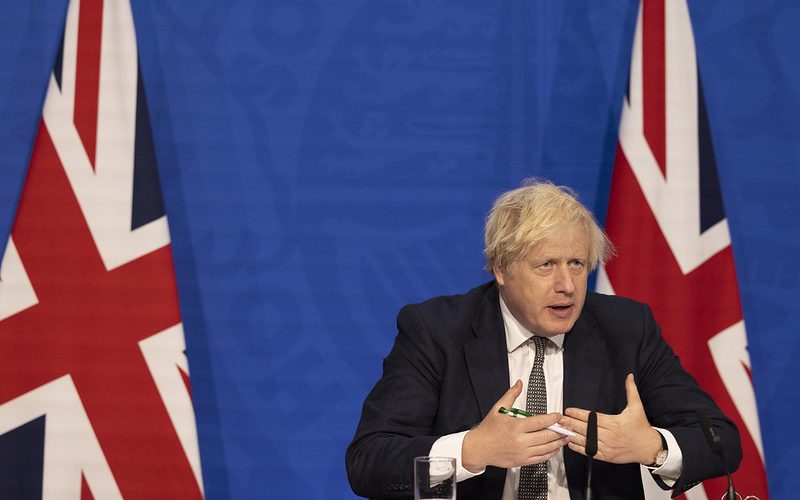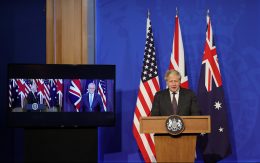When British voters elected to leave the prosperous single market of the European Union in 2016, fears of the economic impact were somewhat quelled by the promise of a series of new trade deals, including with the United States of America, a promising prospect owing to the “special relationship” between the two countries called for by Churchill seven decades prior. Two years after the referendum and with no deal in sight, historian Max Hastings warned the British not to delude themselves that sentiment influences US behaviour. He may be wrong, however, when it comes to Ireland.
The idea that the partnership between the UK and the US will inevitably strengthen has become a staple in British foreign affairs post-Brexit, not least since the AUKUS pact clearly demonstrated the UK’s shifting priorities in the world. Nonetheless, the confidence of Brexiteers in a transatlantic brotherhood is proving premature for two reasons: first, because of the immense differences in policy on sanitary and phytosanitary (SPS) rules between the two countries, and second, because of the increasing tension surrounding the position of Northern Ireland between the UK, to which it belongs, and the island of Ireland, to which it also belongs. While the first reason presents serious logistical barriers and concerns for food and chemical safety among the British public, the second reason could prove to be the nail in the UK-US Trade Deal’s coffin, especially under President Biden.
There is no overstating the US’ support of the terms of the 1998 Good Friday Agreement (GFA). Hailed as one of the great successes of the Clinton Administration’s foreign policy, most Irish people today recall the intervention of the USA, with its tremendous political and financial capacity, as one which fundamentally altered the balance of power in the negotiation of the historic agreement in their favour. In a time of highly polarised US politics, the protection of the GFA remains a staunchly bipartisan issue, a fact regularly reiterated by Biden and other US officials. Aside from being a pillar of US foreign policy, the GFA is part of Biden’s personal identity, as a Catholic with historical family ties to Ireland. As a senator in the 1990s, he used his seat on the Senate foreign relations committee to push the Clinton Administration to commit resources to the brokering of the peace agreement. The future of UK-US cooperation, therefore, rests upon the prevention of a hard border on the island of Ireland, originally secured by the Northern Ireland protocol (NIP) of the Brexit deal, which the British government is now attempting to renegotiate and threatening to violate. There is also a danger, as expressed by US officials, that the British government proves itself untrustworthy by repeatedly undermining the very deals to which it agrees, thereby damaging the future of the transatlantic partnership.
The Northern Irish Question
The status of Northern Ireland is essential to a successful Brexit for both the Conservative-led British government and Northern Ireland’s Democratic Unionist Party (DUP)-led government. Issues arose with the Brexit deal when aspects of the NIP disrupted life in Northern Ireland as custom checks caused delays on certain imports, including meat and medicine. The border in the Irish Sea as a consequence of the NIP prioritises the prevention of a land border on the island of Ireland and discounts the option of a logistically complex Celtic Sea border. Now, the British government points to the existence of a border within the UK, which they say undermines Northern Ireland’s status as part of the kingdom. There are more sentimental implications for the DUP (who did not agree to the deal) and Northern Irish Unionists who are consequently, in their view, rendered less British. Brexit Minister Lord Frost recently declared that mistakes were made by the British government during negotiations and acknowledged the government’s own recognition of this upon signing the deal, meaning a recall to the negotiation table on their part was inevitable. The unilateral extension of grace periods since Brexit further confirms that Northern Ireland is unprepared for the challenges posed by Britain’s decision to leave.
It is unlikely that the majority of those who voted for Brexit, including those in government, realised the extent of the complications that would arise over the border. Talk of a Switzerland-like system showed it was possible to reduce checks on imports. However, this was never the plan for hard-liners who sought a “meaningful” Brexit and greater autonomy over-regulation. Greater autonomy and increased international trade were principal pro-Brexit arguments; Britain would retake its place as a global actor and establish independent trade deals with countries in the Americas, Asia, and Oceania. To achieve this, deregulation of SPS rules from the standards of the EU would be necessary. Such deregulation increases the need for checks, making the placement of the border a key issue.
The reality of a US-UK Trade Deal
Ironically, the very deregulation required for a trade deal between the UK and the USA is that which affects the border with Ireland. Deregulation is only necessary for trade with the USA: trade deals with Australia, New Zealand, and accession to the Comprehensive and Progressive Agreement for Trans-Pacific Partnership (CPTPP), all UK priorities, would not be affected because food standards are not a deal-breaker for Australia, New Zealand or the CPTPP membership. For many Conservative MPs, however, a trade deal with the USA will be the prize of Brexit and the beginning of a global Britain. This will require a revision of the strict SPS policy standards still adhered to by the UK, a key priority for the USA if there is to be a trade deal.
British Prime Minister Boris Johnson has conceded a trade deal is not in the offing in the near future. His government’s persistent renegotiating of the NIP with the EU is no longer concerned with the practical outputs of Brexit, instead, it is symbolic, designed to appease anti-EU sentiment amongst Brexiteers and Unionists. Their reasoning for scrapping the NIP due to lack of cross-community consensus in Northern Ireland became redundant when the opposition party Sinn Féin announced its support of the NIP. It is possible that the British government and unionist Northern Irish government are considering the rising support for Sinn Féin – whose primary concern is to unite Ireland – in the Republic of Ireland and are taking measures to strengthen the union as a result.
A juncture for UK-US relations
Questions must be asked about the prospects for a UK-US trade deal. While there is no doubt of Britain’s keenness, the US government has yet to express anything other than a vague acknowledgement of the possibility of a deal. US officials have repeatedly dodged Britain’s unsubtle prompts that they are ready to see what they were promised. Researchers advised caution on this optimistic attitude on the grounds that former president Trump was unpredictable and quick to take offence, and that if there would be a deal, it would not necessarily be smooth sailing. But there is no guarantee with Biden, either. As Max Hastings reminds us, transatlantic partnerships of interest to the USA in the past required the involvement of Europe as a whole. A failure to reach a consensus on Northern Ireland will almost certainly end in a trade war between Britain and the EU, which will be a less than attractive prospect for the USA.
The path to a trade deal between the UK and the USA is characterised with difficulties, but they are irrelevant if the UK makes good on its threats to trigger Article 16 and violate the GFA in the process. The ensuing political and economic fallout will only hinder the negotiations for a trade deal. The USA will certainly respond with criticism and perhaps direct diplomatic intervention. Biden is likely to take it personally in defence of his Irishness in opposition to Britishness; he has made such jabs in the past. To take this action would leave Britain alone, in a trade war with the EU, with an unstable situation at the Northern Irish border that could quickly become violent, and no trade deal in sight. For transatlantic relations to succeed, Britons must remember they are not the only ones across the pond considered “special” by the USA.
Sources Borger, Julian. (2021) Why Joe Biden is so invested in defending Good Friday agreement. The Guardian, UK. Crawford, Rodrick. (2021) The Northern Ireland Protocol: The Origins of the Current Crisis. Policy Exchange Paper – UK government, UK. Express. (2021) Post-Brexit US trade deal hopes crushed as American ambassador dodges Marr grilling on BBC. express.co.uk, UK. Hastings, Max. (2018) Don’t let’s delude ourselves over the special relationship. The Times, UK. Hazleton, William. (2000) Encouragement from the Sidelines: Clinton’s Role in the Good Friday Agreement. Irish Studies in International Affairs Vol. 11 (2000), pp. 103-119, Royal Irish Academy, Ireland. Lowe, Sam. (2020) Priorities for ‘Global Britain’. Centre for European Reform, London. Lowe, Sam. (2021) The US and the Northern Ireland Protocol: Time to walk the walk. Centre for European Reform, London. The Irish Times. (2021) Unionist leaders jointly declare opposition to Northern Ireland protocol. The Irish Times, Ireland. The Irish Times. (2021) UK backtracking on Brexit ‘doesn’t send right signal’ – US Congressman. The Irish Times, Ireland. The Journal. (2021) Biden stresses importance of NI peace process and downplays trade deal during Johnson meeting. thejournal.ie, Ireland. United States Trade Representative. (2021) National Trade Estimate Report on Foreign Trade Barriers. US Government, USA.








Be First to Comment